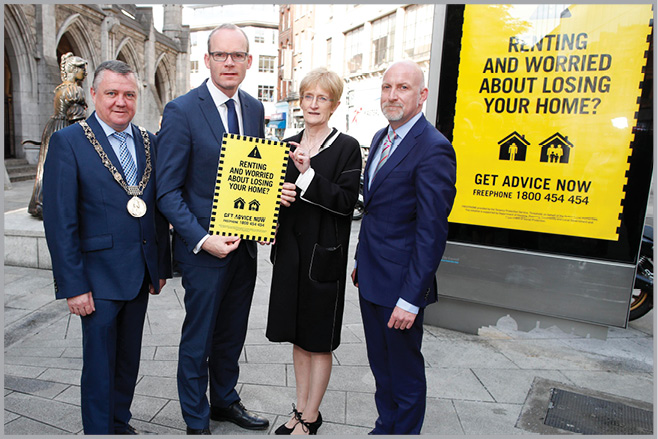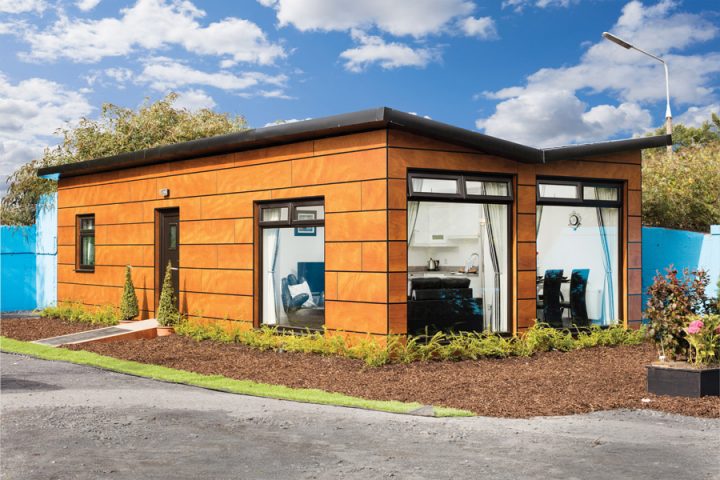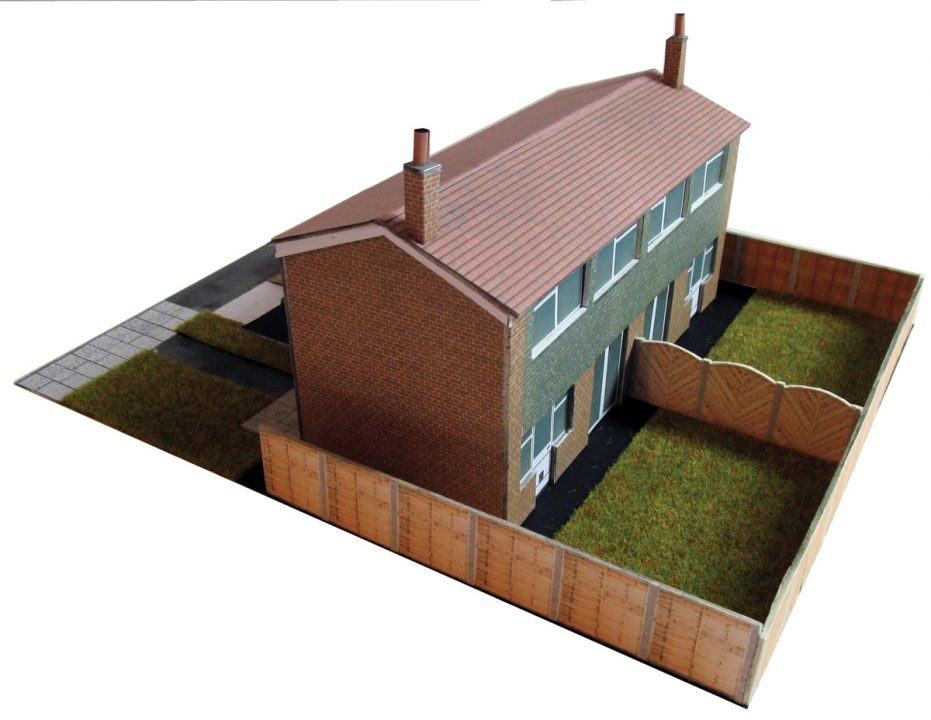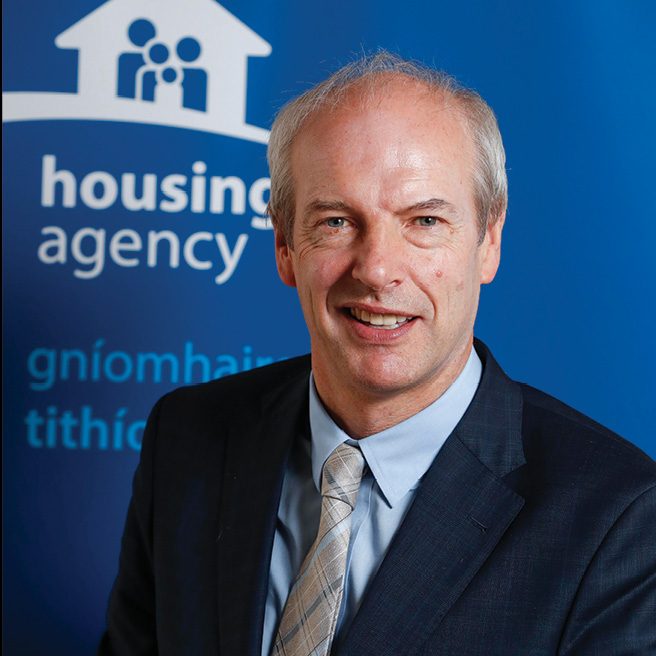
Threshold: Tenancy protection
19th July 2017
Respond: Building Communities
19th July 2017Modular housing represents ‘new innovation’ as Dublin rises to homelessness challenge

Rapid build, modular homes are now playing a central role in allowing the Government and various Dublin Councils to address the homelessness challenge that continues to confront the capital city.
While addressing the immediate homeless situation, the decision to go rapid-build was also taken on the basis that the latest design options combined highly aesthetic development features. Simultaneously, the new homes are also extremely energy efficient.
The Government approved the immediate initiation of a programme for the early delivery of 500 units of modular housing on sites in each of the four Dublin Local Authority areas in September 2015.
The units were to be delivered in two tranches of 150 and 350. In the first instance, Dublin City Council identified five sites in the Dublin City area which could accommodate 153 rapid-build, modular homes.
At the time of the announcement the then Environment Minister Alan Kelly said it was his intention to have an initial 22 units in place by December of that year with a further 128 units to follow through a fast-tracked procurement and planning programme. Thereafter, 350 units would be provided through a national procurement framework, overseen by the Office of Government Procurement.
The Minister committed to using his powers under the Planning and Development Acts to support the use of the fastest planning process in order for the modular units to be in place as quickly as possible and to ease pressure for families residing in hotels and other emergency accommodation.
Kelly said that modular units can offer a much better quality of life than a hotel while families are waiting to be housed in more permanent settings.
He added: “The families that avail of these facilities will continue to have the full set of supports available from homelessness services. They will not be considered to be housed by the local authority; they will remain homeless for statistical purposes.
“However, they will be in a better environment, where their family life will be minimally disrupted. The homes will be built to all necessary building standards with the sites being selected on the basis of access to community infrastructure and services.”
The homeless and housing charity Peter McVerry Trust strongly backed the use of modular housing to tackle the housing and homelessness crisis in the Dublin area. The charity’s CEO Pat Doyle says:
“The main concerns people have about modular housing centre on the issues of quality, cost and delivery times.
“However, I think the commitment of the various Dublin councils has added to the existing international evidence on modular housing and all of those questions have all been answered positively.”
“The main concerns people have about modular housing centre on the issues of quality, cost and delivery times.”
Pat Doyle, Peter McVerry Trust
He adds: “The Peter McVerry Trust has supported efforts to realise modular housing in recent years. We believe that these units can play a small, yet significant role in tackling urgent housing need, particularly for families.
“It is vitally important that the current political attention being paid to the issues of homelessness and housing leads to a realisation across government of the scale of the emergency we face. Urgent action is required to prevent the situation deteriorating further.
“We need to see the immediate introduction of rent certainty measures and rent supplement increases must be delivered in tandem with rent reform to prevent more people slipping into homelessness and, possibly, help some people leave homeless services behind.”
Dublin City Council entered into a contract with Western Building Systems, from Dungannon in County Tyrone, to provide the initial tranche of rapid build homes. The development was named Baile na Laochra. The contract was awarded following an Accelerated Restricted Procedure (ARP) in recognition of the urgency of the family homelessness situation in the Dublin region.
The specification for the contract confirmed the completion of 22 fast build, timber framed homes. Each would be two-storey, with three bedrooms, catering for five people.
A spokesman for Western Building Systems said that Next Generation Timber Frame Modular construction units comprise pre-finished timber framed module systems which, when linked together, create finished buildings. He adds: “These fabricated systems include mechanical and electrical services, as well as internal and external finishes. Next Generation Timber modules are fully built within our factory. As a consequence, we are able to utilise tools unavailable to the site builder. These include custom manufactured jigs which ensure that all walls, floors and ceilings are square and plumb.
“Each home undergoes a strict quality control check at each stage of construction, in controlled conditions that are never affected by the elements.
“A modular home can be built in one third of the time required to construct a house from scratch, on-site.”
The estimated cost for the provision of the 22 housing units was €4.2 million. The Baile na Laochra homes are fully compliant with new Building Control Regulations.
Initial protests held up site work for a week. This was followed by a period of very poor weather, which meant that the first tranche of families did not move into their new accommodation until spring 2016.
The protesters were members of CTSL Co-op. However, in April 2016 protests were also held at the Finglas site, also identified by Dublin City Council for modular housing development. As before the focus was on the fast track planning procedures followed to get the project off the ground.
For their part, the four Dublin local authorities arranged a modular housing demonstration at East Wall, which remained in place for three weeks. The demonstration comprised six different types of modular units. The objective of the demonstration was to facilitate a debate on the viability and functionality of modular housing, as a measure to house homeless families, while the main house building programme was advanced.
Over 700 people visited the site from a variety of sectors, including city and county councillors, Members of Dáil Éireann, NGO homeless service organisations plus a number of homeless families.
A representative for the protesting Finglas Action Group said that the local community wanted the full protection of the planning laws, which recommend the full integration and the provision of services.
He added: “Developing an estate to accommodate up to 2,000 people, without adhering to the required planning recommendations, is a completely unnatural way to develop housing units”.
In September of 2016, Dublin City Council confirmed that it had agreed the final account with Western Building Systems for the construction of the Baile na Laochra project. The agreed sum worked out at €180,000 per house. According to the Council, this is significantly below budget. The entire site is now fully serviced with infrastructure, utilities and an ESB substation.
However, not everyone is happy with the cost of the homes, including Sinn Féin Councillor Noeleen Reilly, who believes the price of the units is “still too high”. “There was a lot of fear in the community about the cost of the modular units in Baile na Laochra.
“I’m glad a final figure has been agreed and there is now clarity going forward. “However, the price of €180,000 per unit is much greater than we were initially led to believe the costs would be when this debate started.”






